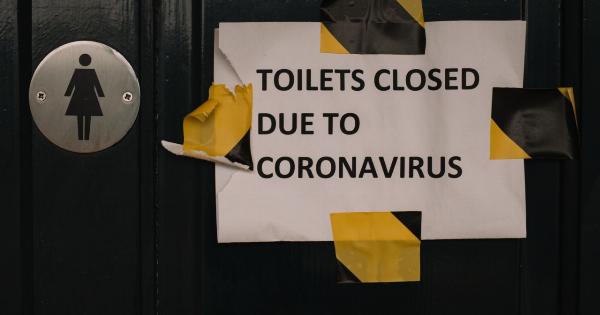Good toilet habits are often overlooked when it comes to maintaining good health. However, the way we use the toilet can have a significant impact on various aspects of our well-being.
From preventing infections to promoting proper digestion, following good toilet habits is essential for overall health. In this article, we will explore the importance of good toilet habits and provide practical tips for maintaining a healthy toilet routine.
1. Reducing the Risk of Infections
One of the critical reasons to practice good toilet habits is to reduce the risk of infections.
Poor toilet hygiene can lead to the transfer of harmful bacteria and viruses, resulting in various infections such as urinary tract infections (UTIs), gastrointestinal infections, and even sexually transmitted infections (STIs).
To minimize the risk of infections:.
– Always wash your hands thoroughly with soap and water after using the toilet.
– Wipe from front to back to prevent the spread of bacteria from the anal area to the urinary and genital areas.
– Regularly clean and sanitize the toilet seat, flush handle, and other frequently touched surfaces in the bathroom.
2. Preventing Hemorrhoids
Hemorrhoids, also known as piles, are swollen veins in and around the rectum and anus. They can be incredibly uncomfortable and painful.
Poor toilet habits, such as straining during bowel movements and spending excessive time on the toilet, can contribute to the development of hemorrhoids.
To prevent hemorrhoids:.
– Do not strain excessively while passing stools. If you are having difficulty, try increasing your fiber intake or using stool softeners.
– Avoid sitting on the toilet for extended periods. Sitting for too long can increase pressure on the rectal area and worsen hemorrhoids.
– Maintain a healthy diet rich in fiber and drink plenty of water to promote regular bowel movements.
3. Promoting Regular Bowel Movements
A healthy bowel movement pattern is crucial for maintaining good digestive health.
Consistently ignoring the urge to pass stools or forcing yourself to go when not needed can disrupt your natural bowel movement rhythm and lead to constipation or diarrhea.
To promote regular bowel movements:.
– Listen to your body and respond to the urge to pass stools promptly.
– Establish a routine by attempting to have a bowel movement at the same time every day.
– Ensure your diet includes enough fiber from fruits, vegetables, whole grains, and legumes.
– Stay physically active as exercise helps stimulate bowel motility.
4. Preventing Urinary Tract Infections (UTIs)
Urinary tract infections (UTIs) are common infections that primarily affect the bladder and urethra.
Poor toilet habits, such as wiping back to front or holding in urine for prolonged periods, can increase the risk of UTIs by introducing bacteria into the urinary tract.
To prevent UTIs:.
– Always wipe from front to back after using the toilet.
– Urinate regularly and do not hold in urine for an extended period.
– Drink plenty of water to flush out bacteria from the urinary system.
– Avoid using harsh or scented soaps in the genital area, as they can disrupt the natural balance of bacteria.
5. Maintaining Hygiene During Menstruation
Good toilet habits are especially crucial during menstruation to ensure proper hygiene and prevent infections. Menstrual blood can become a breeding ground for bacteria, so it is essential to maintain cleanliness during this time.
To maintain hygiene during menstruation:.
– Change sanitary pads or tampons at regular intervals (every 4-6 hours).
– Wash your hands before and after changing sanitary products.
– Clean the genital area with mild, unscented soap and water.
– Avoid using scented hygiene products, as they can disrupt the natural pH balance of the vagina.
6. Teaching Children Good Toilet Habits
Instilling good toilet habits in children from a young age is essential for their future health and hygiene.
Teaching them the importance of handwashing, proper wiping techniques, and regular toilet routines can help prevent infections and promote healthy habits.
To teach children good toilet habits:.
– Lead by example and demonstrate the proper way to use the toilet and wash hands.
– Encourage regular toilet breaks and respond promptly to their bathroom needs.
– Use age-appropriate language to explain the importance of hygiene and cleanliness.
– Provide child-friendly tools such as step stools or adapted toilets to make the process easier.
7. Aiding Digestion and Nutrient Absorption
Good toilet habits can also contribute to proper digestion and nutrient absorption in the body.
When waste accumulates in the intestines due to infrequent bowel movements or constipation, it can hinder the absorption of essential nutrients from the food we consume.
To aid digestion and nutrient absorption:.
– Maintain a balanced diet rich in fiber to promote regular bowel movements.
– Stay hydrated by drinking an adequate amount of water throughout the day.
– Avoid consuming excessive amounts of processed foods or foods high in saturated fats.
– Practice mindful eating and chew food thoroughly to ease digestion.
8. Promoting Mental and Emotional Well-being
Believe it or not, good toilet habits can also contribute to your mental and emotional well-being.
Having a clean and comfortable toilet environment, practicing good hygiene, and avoiding discomfort from conditions like hemorrhoids or infections can positively influence your overall mood and mental state.
To promote mental and emotional well-being:.
– Keep the toilet clean and well-maintained.
– Ensure proper ventilation in the bathroom to eliminate unpleasant odors.
– Avoid straining or spending excessive time on the toilet, as it can cause discomfort and frustration.
– Allow yourself peaceful and uninterrupted bathroom breaks to relax and unwind.
9. Preventing the Spread of Germs
Practicing good toilet habits is crucial for preventing the spread of germs, not only to yourself but also to others. In a shared or public restroom, proper hygiene practices protect everyone from potential illnesses.
To prevent the spread of germs:.
– Always flush the toilet after use.
– Close the lid before flushing to prevent the dispersal of droplets and germs into the air.
– Use disposable toilet seat covers or toilet paper as a barrier between the seat and your skin.
– Use hand sanitizers or wash your hands thoroughly with soap and water after using a public restroom.
10. Maintaining Urinary and Reproductive Health
Lastly, good toilet habits play a vital role in maintaining urinary and reproductive health.
By following proper hygiene practices, you can reduce the risk of urinary tract infections (UTIs), vaginal infections, and other conditions that can affect your urinary or reproductive systems.
To maintain urinary and reproductive health:.
– Wipe from front to back after using the toilet.
– Wear clean and breathable underwear.
– Avoid using harsh soaps or other irritants in the genital area.
– Visit your healthcare provider regularly for routine check-ups and screenings.































